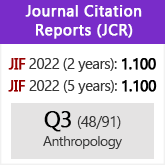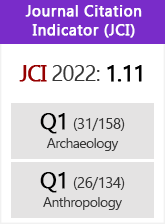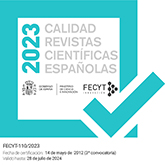Phoenicians and native people in Tartessos. Reflections concerning the colonial relationship and change in the S.W. of the Iberian Peninsula
DOI:
https://doi.org/10.3989/tp.1995.v52.i1.434Keywords:
Metallurgy, Unequal exchange, Cultural change, OrientalizingAbstract
Phoenician colonization during the VIIIth and VIIth centuries B.C. is perceived economically as based on long/ distance trade and unequal exchange. This has further implications on social -though not cultural- change in the Late Bronze Age village communities in the S.W. of the Iberian Peninsula, given the local elite's dependence on those relations and the economic destructuration which they brought about. The importance of metalworking is discussed. We comment on the Phoenician presence inland, in contrast to the coastal settlements, as a way of understanding better the strong orientalizing acculturation observed in archaeological data (burial evidence).
Downloads
Download data is not yet available.
Downloads
Published
1995-06-30
How to Cite
Wagner, C. G. (1995). Phoenicians and native people in Tartessos. Reflections concerning the colonial relationship and change in the S.W. of the Iberian Peninsula. Trabajos De Prehistoria, 52(1), 109–126. https://doi.org/10.3989/tp.1995.v52.i1.434
Issue
Section
Articles
License
Copyright (c) 1995 Consejo Superior de Investigaciones Científicas (CSIC)

This work is licensed under a Creative Commons Attribution 4.0 International License.
© CSIC. Manuscripts published in both the printed and online versions of this Journal are the property of Consejo Superior de Investigaciones Científicas, and quoting this source is a requirement for any partial or full reproduction.All contents of this electronic edition, except where otherwise noted, are distributed under a “Creative Commons Attribution 4.0 International” (CC BY 4.0) License. You may read here the basic information and the legal text of the license. The indication of the CC BY 4.0 License must be expressly stated in this way when necessary.
Self-archiving in repositories, personal webpages or similar, of any version other than the published by the Editor, is not allowed.
















